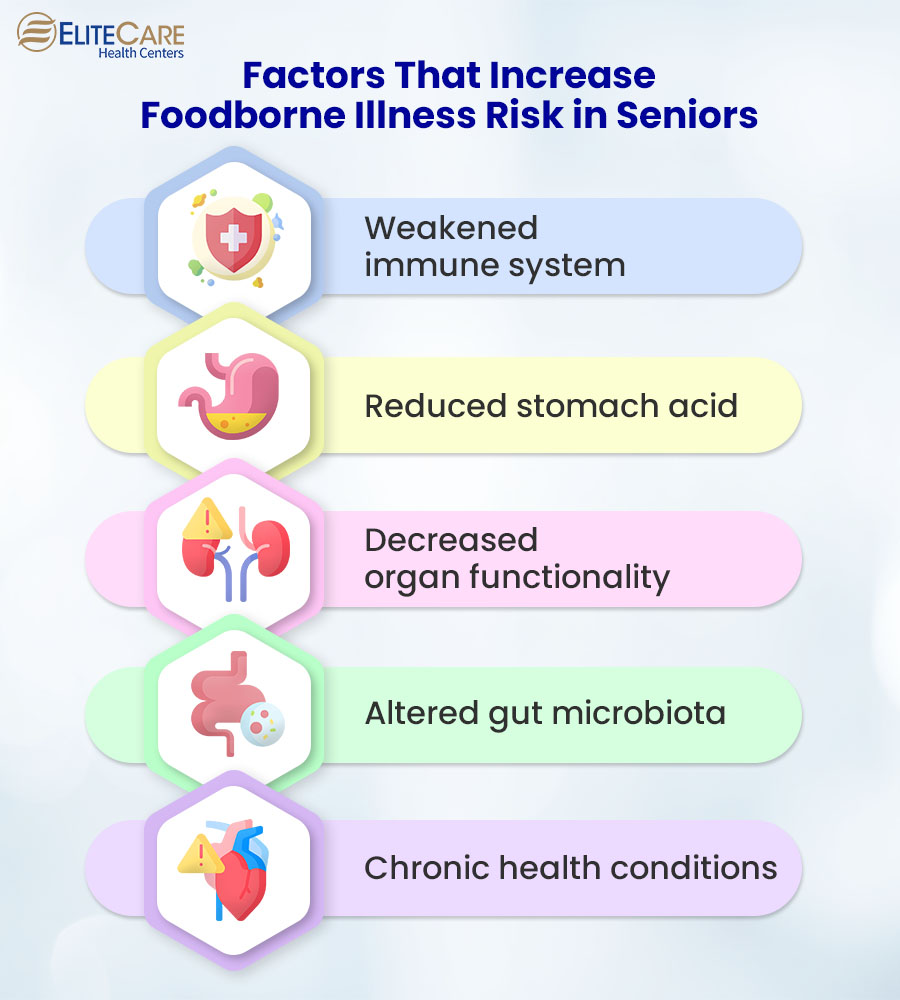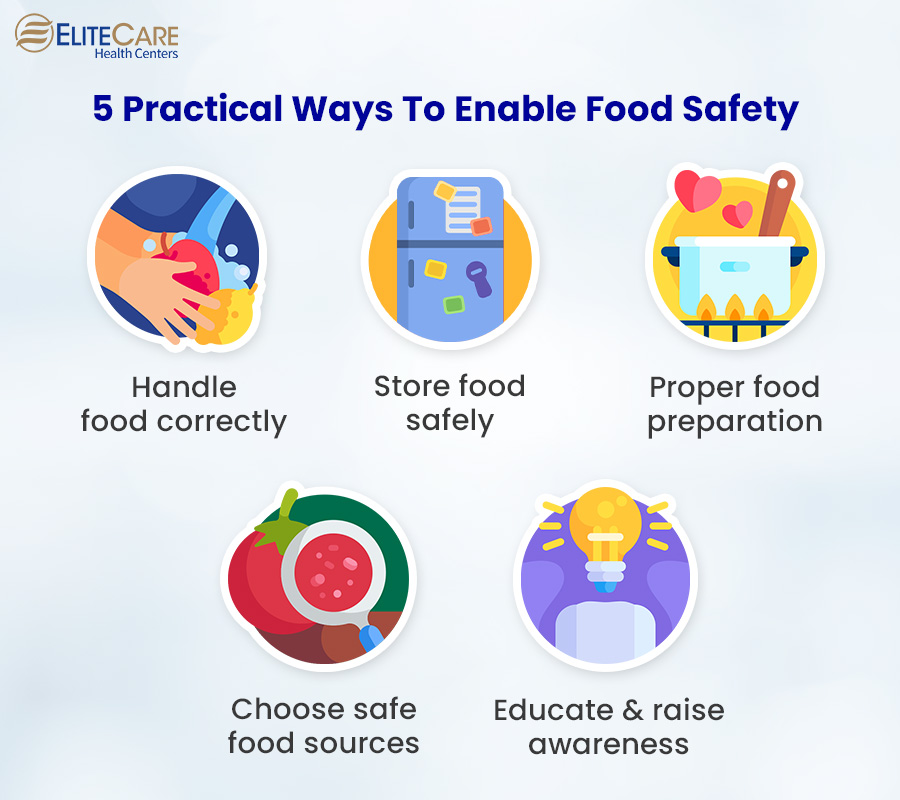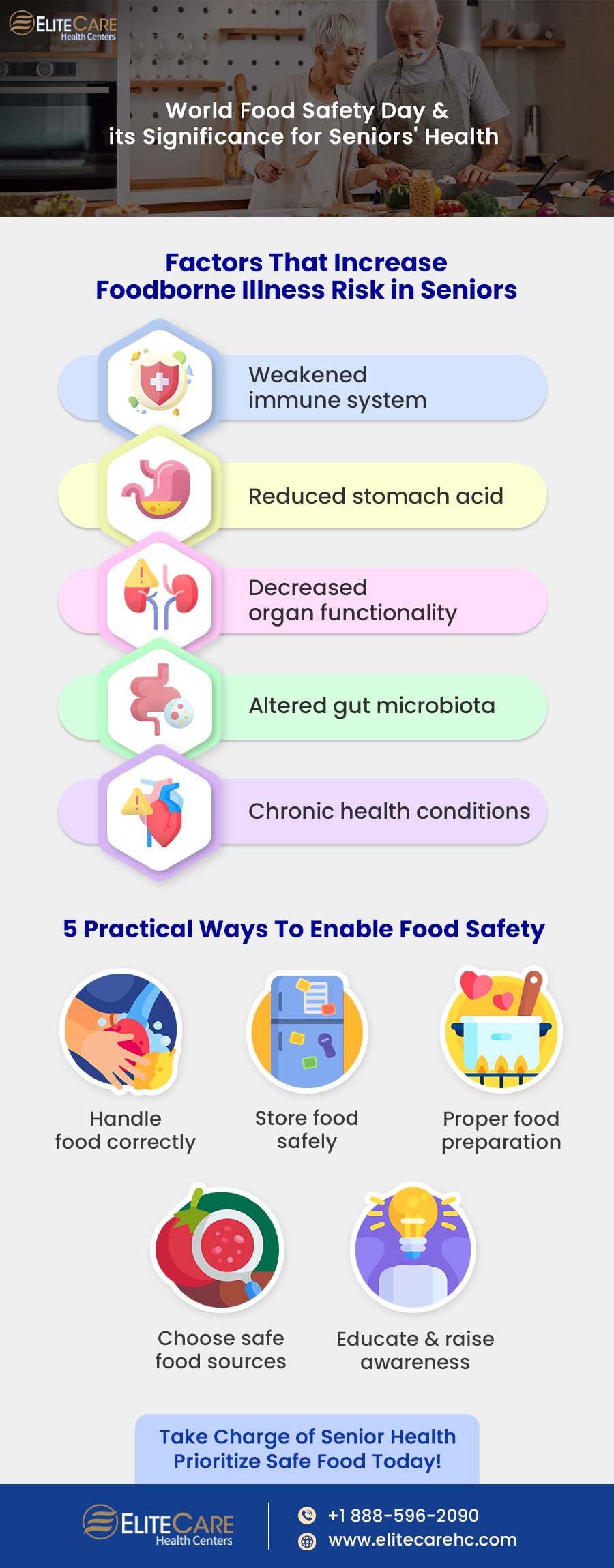
World Food Safety Day is an annual global observance established by the United Nations to raise awareness about the importance of safe food practices. Celebrated on June 7th each year, this day aims to promote actions to prevent, detect, and manage foodborne health risks, ensuring the safety and quality of food for all.
The significance of safe food becomes even more critical when considering its impact on seniors. CDC estimates that each year roughly 1 in 6 Americans experience foodborne diseases. Among them, adults aged 65 and older are more likely to be hospitalized or experience severe complications from foodborne illnesses. Safe food practices play a crucial role in meeting the unique dietary needs of seniors as their nutritional requirements change with age. Focusing on nutrient-dense foods that provide essential vitamins, minerals, and antioxidants becomes essential, ensuring a balanced diet that supports healthy aging and prevents malnutrition in seniors.
Why Are Seniors at High Risk of Foodborne Illnesses?
With age, the body undergoes physiological changes, making it more vulnerable to foodborne illnesses. Seniors often experience weakened immune systems, reduced stomach acid production, and decreased functionality of vital organs. These changes can impair the body’s ability to fight off harmful bacteria, viruses, and other pathogens in contaminated food.
It is essential to safeguard seniors from foodborne illnesses and their potential consequences to maintain good health, independence, and overall quality of life. By implementing and promoting food safety measures, including rigorous inspections and adherence to regulations, we can protect seniors’ health and ensure that the food they consume at home, in restaurants, and in medical clinics meets the highest safety standards.
Vulnerabilities of Seniors to Foodborne Illnesses

The World Food Safety Day helps us to recognize that seniors are more susceptible to foodborne illnesses. Several factors can contribute to their increased risks which are as follows:
1. Weakened Immune System
The immune system plays a crucial role in defending the body against harmful bacteria, viruses, and other pathogens present in food. However, with age, the immune system naturally weakens, diminishing its ability to combat pathogens effectively. This weakened immune response makes seniors more susceptible to infections caused by foodborne pathogens, such as Salmonella, E. coli, and Listeria.
2. Reduced Stomach Acid
Stomach acid helps kill bacteria and other microbes that are ingested with food. However, aging can lead to a decrease in stomach acid production. This reduction in acid level can create an environment where bacteria and other pathogens can survive and multiply, increasing the risk of foodborne illnesses.
3. Decreased Organ Functionality
With age, there is a decline in organ functionality, particularly in vital organs such as the liver and kidneys. These organs play essential roles in detoxification and waste removal. When their function is compromised, the body may suffer to detoxify, further increasing the risk of foodborne illnesses.
4. Altered Gut Microbiota
Gut Microbiota is a community of microorganisms in the digestive tract that plays a significant role in maintaining gut health and supporting the immune system. With age, the composition of the gut microbiota may change, resulting in an imbalance known as dysbiosis. This dysbiosis can weaken the protective barrier of the gut and increase susceptibility to foodborne pathogens.
5. Chronic Health Conditions
Seniors often have pre-existing chronic health conditions like diabetes, cardiovascular disease, or autoimmune disorders. These conditions can weaken the immune system and impair the body’s ability to fight infections. Routine physical exam for chronic health conditions at healthcare centers is a must.
Considering these factors, it becomes evident that the physiological changes that occur with age significantly increase the vulnerability of seniors to foodborne illnesses. It is necessary to take proactive measures to ensure the food’s safety, including proper handling, storage, and preparation techniques, as well as adherence to food safety regulations and guidelines.
Impact of Foodborne Illnesses on Seniors
Foodborne illnesses can have significant consequences on the health of seniors. Understanding the potential impact is crucial for seniors, caregivers, or primary care physicians providing in-person or online doctor consultations. Here are some points to consider:
1. Increased Risk of Severe Symptoms
Seniors are more likely to experience severe symptoms when infected with foodborne pathogens than younger individuals. Common symptoms include nausea, fever, vomiting, diarrhea, abdominal pain. These symptoms can be more intense and prolonged in seniors, leading to discomfort, dehydration, and electrolyte imbalances.
2. Higher Likelihood of Complications
Seniors’ complications due to foodborne pathogens include severe dehydration, electrolyte imbalances, organ failure, and secondary infections. The presence of underlying chronic health conditions further increases the risk of complications, as their bodies may struggle to cope with the additional stress caused by the illness.
3. Increased Chances of Hospitalization
Foodborne illnesses can lead to hospitalizations among seniors. The severity of symptoms and complications may necessitate medical intervention and supportive care. Hospitalization provides a controlled environment for monitoring and managing illness, ensuring seniors receive the necessary treatment to recover.
4. Potential Long-Term Effects on Well-being
Even after recovering from an acute infection caused by foodborne illnesses, seniors may experience a prolonged recovery period and weakness. The impact on their physical and cognitive functions can lead to decreased mobility, loss of independence, and a decline in overall quality of life. Seniors may also face a higher risk of subsequent infections and an increased susceptibility to other health complications.
Significance of Safe Food
Safe food is of paramount importance for several reasons. Firstly, it ensures the protection of public health. Consumption of contaminated or unsafe food can lead to foodborne illnesses, resulting in severe health consequences, especially for vulnerable populations such as seniors.
Secondly, it meets the unique dietary needs of individuals, including seniors, by providing nutrient-dense foods and balanced diets. Additionally, safe food practices build consumer confidence, fostering trust in the food supply chain. This trust is crucial for the success of the food industry and ensures the consistent implementation of safe food practices. Lastly, safe food contributes to the economic well-being of communities by avoiding the costs associated with foodborne illnesses and maintaining the reputation of businesses.
By prioritizing safe food safety in healthcare clinics and other settings, we can protect seniors from foodborne illnesses and also prevent malnutrition.
Practical Ways To Enable Food Safety into Daily Life

Some practical tips and guidelines to enable food safety for older adults are as follows:
1. Handle Food Properly
- Wash hands thoroughly before handling food.
- Clean and sanitize food-preparing surfaces, utensils, and equipment.
- Separate raw meats, poultry, and seafood to avoid cross-contamination.
- Cook foods to appropriate temperatures to kill bacteria.
2. Store Food Safely
- Refrigerate perishables to maintain freshness and prevent bacteria growth.
- Keep refrigerator below 40°F (4°C) and freezer below 0°F (-18°C).
- Label and date leftovers for easy tracking and discard them when past safe storage times.
- Avoid consuming expired or spoiled foods.
3. Proper Food Preparation
- Wash fruits and vegetables thoroughly before cooking or eating.
- Cook eggs, meats, poultry, and seafood thoroughly to kill bacteria.
- Use separate cutting boards and utensils for raw and cooked foods.
- Avoid consuming unpasteurized dairy products and raw or undercooked seafood.
4. Choose Safe Food Sources
- Choose reputable suppliers and establishments.
- Look for proper labeling with expiry dates, ingredients, and nutrition information.
- Check for quality seals, certifications, or third-party audits indicating adherence to safety standards.
- Exercise caution when consuming food at a buffet, salad bar, or street vendor, ensuring they are following food safety practices.
5. Education and Awareness
- Educate seniors, caregivers, and healthcare providers on safe food practices.
- Raise awareness about World Food Safety Day and its significance for seniors.
- Encourage seniors to seek guidance from healthcare clinics for dietary needs and safe food practices.
Resources and Organizations
Several resources and organizations provide valuable information and support in promoting food safety for seniors. Here are a few examples:
- Centers for Disease Control and Prevention (CDC): The CDC offers resources, guidelines, and educational materials on food safety, including specific recommendations for seniors and caregivers.
- Food Safety and Inspection Service (FSIS): A branch of the United States Department of Agriculture (USDA), FSIS provides food safety information, tips, and resources to promote safe food handling and prevent foodborne illnesses.
- National Council on Aging (NCOA): The NCOA offers educational programs and resources focused on senior health and well-being, including information on nutrition, food safety, and preventing foodborne illnesses.
- Local Health Departments: They often provide educational materials, workshops, and community outreach programs on food safety, which can benefit seniors and their caregivers.
Utilizing these resources and organizations is essential to access accurate and reliable information on food safety practices.
To Sum Up
Ensuring food safety for seniors requires a collective effort from individuals, caregivers, healthcare providers, and governments. Awareness about World Food Safety Day highlights the significance of safe food for seniors. By sharing information and promoting safe food practices, we can contribute to a safer food environment for this vulnerable population.
Elite Care Health Center’s primary care service providers provide annual physical exams to ensure seniors’ overall health and well-being. Through our expertise and commitment to senior care services, we can help seniors maintain a healthy lifestyle and minimize the risk of foodborne illnesses.






